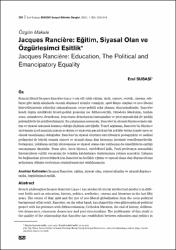| dc.contributor.author | Subaşi, Erol | |
| dc.date.accessioned | 2023-02-21T06:07:28Z | |
| dc.date.available | 2023-02-21T06:07:28Z | |
| dc.date.issued | 2021 | en_US |
| dc.identifier.citation | Subaşi, E. (2021). Jacques Rancière: Eğitim, Siyasal Olan veÖzgürleşimci Eşitlik. MSGSÜ Sosyal Bilimler Dergisi, 1(23), 228-243. | en_US |
| dc.identifier.issn | 1309-4815 | |
| dc.identifier.issn | 2822-6852 | |
| dc.identifier.uri | https://dergipark.org.tr/tr/pub/msgsusbd/issue/69550/1108114 | |
| dc.identifier.uri | https://hdl.handle.net/11436/7651 | |
| dc.description.abstract | Fransız filozof Jacques Rancière (1940-) son elli yılda eğitim, tarih, siyaset, estetik, sinema, edebiyat gibi farklı alanlarda önemli düşünsel ürünler vermiştir. 1968 Mayıs olayları ve neo-liberal
küreselleşmenin yükselişi çalışmalarının sosyo-politik arka planını oluşturmaktadır. Rancière
kendi özgün nitelikteki felsefi-politik projesini ise Althussercilik, Ortodoks Marksizm, tarihin
sonu, müzakereci demokrasi, konsensüs demokrasisi tartışmaları ve post-yapısalcılık ile girdiği
polemiklerle ile şekillendirmiştir. Bu çalışmanın sorunsalı, Rancière’in siyasal düşüncesinde eğitim ve siyasal arasında kurmuş olduğu ilişkinin niteliğidir. Temel argüman, Rancière’in düşünce
sisteminin içsel mantığı uyarınca eğitim ve siyasetin paradoksal bir şekilde birbiri içinde mevcut
olarak tasarlanmış olduğudur. Rancière’in siyasal eleştirisi özü itibariyle pedagojiktir ve radikal
pedagojisi de büyük oranda siyaset ve siyasal olana dair kavrayışı üzerinde temellenmektedir.
Pedagojisi, zekâların eşitliği aksiyomuna ve siyasal olana dair yaklaşımı da öznelliklerin eşitliği
varsayımına dayalıdır. Buna göre, hoca-öğrenci, entelektüel-halk, Parti-proletarya arasındaki
hiyerarşilerin eşitlik varsayımı ile ortadan kaldırılması özgürleşimin yolunu açacaktır. Çalışma
bu bağlantıları gösterebilmek için Rancière’in özellikle eğitim ve siyasal olana dair düşüncelerini
geliştirmiş olduğu eserlerinin çözümlenmesine odaklanmıştır. | en_US |
| dc.description.abstract | French philosopher Jacques Rancière (1940-) has produced crucial intellectual products in different fields such as education, history, politics, aesthetics, cinema and literature in the last fifty
years. The events of May 1968 and the rise of neo-liberal globalization form the socio-political
background of his work. Rancière, on the other hand, has shaped his own philosophical-political
project with his polemics with Althusserianism, Orthodox Marxism, the end of history, deliberative democracy, consensus democracy and post-structuralism. The problematic of this study is
the quality of the relationship that Rancière has established between education and politics in his political thought. The basic argument is that, in accordance with the internal logic of
Rancière’s system of thought, education and politics are paradoxically designed to be present
within each other. Rancière’s political critique is pedagogical in essence; and his radical pedagogy is also largely based on politics and his understanding of the political. His pedagogy is
based on the axiom of equality of intelligence, and his approach to the political is based on the
assumption of equality of subjectivities. The abolition of the hierarchies between the teacherstudent, the intellectual-the people, the Party and the proletariat with the assumption of equality will pave the way for emancipation. In order to show these connections, the study focused
on analyzing Rancière’s works, in which he developed his thoughts especially on education and
the political. | en_US |
| dc.language.iso | tur | en_US |
| dc.publisher | Mimar Sinan Güzel Sanatlar Üniversitesi | en_US |
| dc.rights | info:eu-repo/semantics/openAccess | en_US |
| dc.subject | Jacques Rancière | en_US |
| dc.subject | Eğitim | en_US |
| dc.subject | Siyasal olan | en_US |
| dc.subject | Siyasal akımlar ve siyasal düşünce tarihi | en_US |
| dc.subject | Özgürleşimci eşitlik | en_US |
| dc.title | Jacques Rancière: Eğitim, siyasal olan ve özgürleşimci eşitlik | en_US |
| dc.title.alternative | Jacques Rancière: Education, the political and emancipatory equality | en_US |
| dc.type | article | en_US |
| dc.contributor.department | RTEÜ, İktisadi ve İdari Bilimler Fakültesi, Siyaset Bilimi ve Kamu Yönetimi Bölümü | en_US |
| dc.contributor.institutionauthor | Subaşi, Erol | |
| dc.identifier.volume | 1 | en_US |
| dc.identifier.issue | 23 | en_US |
| dc.identifier.startpage | 228 | en_US |
| dc.identifier.endpage | 243 | en_US |
| dc.relation.journal | MSGSÜ Sosyal Bilimler Dergisi | en_US |
| dc.relation.publicationcategory | Makale - Uluslararası Hakemli Dergi - Kurum Öğretim Elemanı | en_US |


















